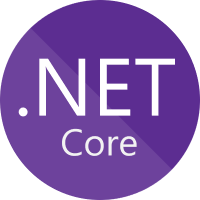Top 50 C# Interview Questions and Answers To Get Hired
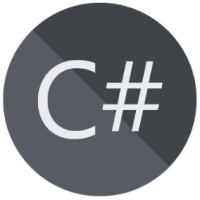
C# Programming For Beginners Free Course
Top 50 C# Interview Questions and Answers: An Overview
Explore our comprehensive guide featuring 50 essential C# interview questions and expertly crafted answers. Whether you're a beginner or an experienced developer, this resource equips you with in-depth knowledge to excel in C# interviews with the help of these C# language questions. To make things easier for you, ScholarHat brings a comprehensive skill-oriented C# certification to the nitty-gritty of the C# language. If you want to become a C# Developer just go with the C# Developer Roadmap and be a master in it.Let's begin with C# basic interview questions for freshers.
C# Interview Questions and Answers for Freshers
1. What are the features of C# language?
- Object-Oriented: C# supports object-oriented programming principles, allowing for encapsulation, inheritance, and polymorphism.
- Type-Safe: It enforces strong type checking, enhancing type safety and preventing type-related errors.
- Interoperability: C# can interoperate with other languages and libraries, facilitating integration with existing systems.
- Memory Management: C# uses automatic garbage collection to manage memory, reducing the risk of memory leaks.
- Exception Handling: It provides robust error-handling mechanisms, enabling developers to handle exceptions gracefully.
- Modern Language Features: C# includes features like properties, events, and delegates for efficient and expressive coding.
2. How is C# different from the C programming language?
C# and C differ in several key aspects:
| C# | C |
| C# is primarily object-oriented, emphasizing classes and objects. | C is procedural, focusing on functions and structures. |
| C# has automatic memory management (garbage collection), reducing the risk of memory leaks. | C requires manual memory allocation and deallocation. |
| C# is designed for the .NET framework, making it platform-independent. | C code needs to be recompiled for different platforms. |
| C# syntax is more modern and user-friendly, incorporating features like properties, events, and delegates. | These are not present in C. |
| C# offers a rich standard library for various tasks, simplifying development. | C has a smaller standard library, requiring more external libraries for complex tasks. |
3. Explain the evolution history of C#
- C# was developed by Microsoft in the late 1990s.
- It was first released as part of the .NET framework in 2000.
- C# 2.0 introduced generics and nullable types in 2005.
- C# 3.0 brought language enhancements like LINQ and lambda expressions in 2007.
- C# 5.0 introduced async and await keywords in 2012.
- C# 7.0, 8.0, and 9.0 continued to add new features and improvements, enhancing the language's capabilities.
4. What is Common Language Runtime (CLR)?
The Common Language Runtime (CLR) is a key component of the .NET framework. It provides a runtime environment for executing managed code, enabling language interoperability and automatic memory management. CLR manages program execution, ensuring code safety and security, handling exceptions, and supporting features like garbage collection. It compiles source code into an intermediate language (IL) and translates it to machine code at runtime, allowing programs written in different languages to run on any platform with CLR support, enhancing software development efficiency and flexibility.
5. What are indexers in C# .NET?
In C# .NET, indexers allow objects to be indexed like arrays. They enable instances of a class to be accessed using array-like syntax. Indexers are defined using special methods within a class and provide a way to get or set values based on an index, enhancing the flexibility of custom data structures.
6. What is the JIT compiler process in C#?
In C#, the Just-In-Time (JIT) compiler is responsible for converting intermediate language (IL) code into native machine code at runtime. It compiles methods on demand when they are first called, optimizing code execution for specific hardware and improving the overall performance of the application.
7. What are the types of classes in C#?
In C#, classes are essential for object-oriented programming. Here are the types of classes in C#:
- Abstract Class: Cannot be instantiated and serves as a base for other classes.
- Sealed Class: Prevents further inheritance, ensuring the class cannot be extended.
- Static Class: Cannot be instantiated, contains only static members, often used for utility functions.
- Partial Class: Divides a class into multiple files, allowing multiple developers to work on it simultaneously.
8. What is Garbage Collection in C#?
Garbage collection in C# is an automatic memory management process. It identifies and deallocates unused objects, preventing memory leaks and optimizing memory usage. Developers don't need to manually release memory, enhancing code reliability and simplicity.
- Automatic Memory Management: C# uses a garbage collector to automatically manage memory.
- Identifies Unused Objects: The garbage collector identifies and deallocates memory occupied by objects no longer in use.
- Prevents Memory Leaks: Ensures unused objects are removed, preventing memory leaks and improving application stability.
- Efficient Memory Usage: Optimizes memory usage by reclaiming memory from discarded objects.
- No Manual Cleanup: Developers don't need to manually release memory, reducing the risk of bugs and improving developer productivity.
9. What is the difference between a C# abstract class and an interface?
Abstract Class:
- Can have abstract and concrete methods.
- Can have fields, constructors, and properties.
- Supports access modifiers for methods and fields.
- Allows method implementation.
- Supports single inheritance.
- Can contain access modifiers for classes.
Interface:
- Contains only abstract methods.
- Cannot have fields, constructors, or method implementations.
- All methods are public by default.
- Supports multiple inheritance.
- Cannot contain access modifiers for interfaces.
Abstract classes provide a way to share code among related classes, while interfaces define a contract for classes to implement specific behaviors.
10. What is Datatype in C#?
In C#, a datatype specifies the type of data a variable can hold. C# supports various datatypes, including:
Value Types: Represents data with a specific value.
- Integers: int, long, short
- Floating-Point Numbers: float, double
- Characters: char
- Booleans: bool
Reference Types: Store references to the memory location of objects.
- Classes: class
- Interfaces: interface
- Arrays: Array
- Delegates: delegate
- Strings: string
These datatypes enable developers to work with different kinds of data efficiently in C#.
11. What is the difference between value types and reference types in C#?
| Value Type | Reference Type |
| Store data directly in memory. | Store references to the memory location. |
| Derived from System.ValueType. | Derived from System.Object. |
| Examples include int, float, and char. | Examples include classes, interfaces, and arrays. |
| Allocated on the stack. | Allocated on the heap. |
| Memory management is efficient. | Memory management is complex. |
| Copying creates independent copies. | Copying creates new references pointing to the same object. |
12. What is inheritance in C#? Does C# support multiple inheritance?
Inheritance in C# allows a class (derived or child class) to inherit properties and behavior from another class (base or parent class). It promotes code reusability, enabling the creation of new classes based on existing ones, and inheriting their attributes and methods while allowing further customization and extension.
No, C# does not support multiple inheritance for classes. However, it supports multiple inheritance through interfaces, allowing classes to implement multiple interfaces to achieve similar functionality without the complications associated with multiple inheritance in classes.
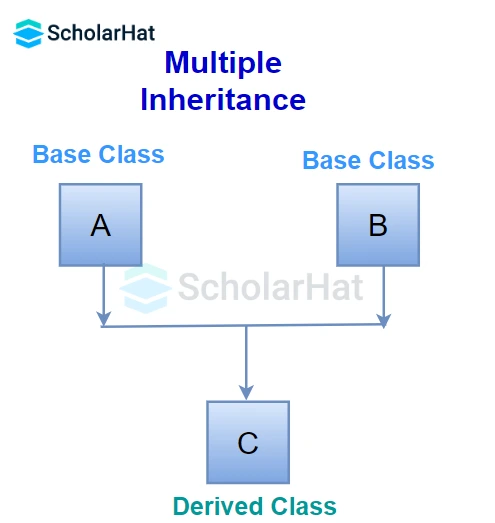
13. What is Managed or Unmanaged Code in C#?
Managed Code- Managed code in C# refers to the source code that is written to target the Common Language Runtime (CLR) environment. It is executed by the CLR, which provides services like memory management, security, and exception handling. Managed code ensures better performance, security, and easier maintenance of applications.
Unmanaged Code- Unmanaged code in C# refers to code that runs outside the control of the Common Language Runtime (CLR). It is typically written in languages like C or C++ and directly interacts with system hardware and resources. Unmanaged code requires manual memory management and lacks the safety features of managed code.
14. Explain the four steps involved in the C# code compilation.
- Preprocessing: Directives are processed (#include, #define).
- Compilation: Source code translated into intermediate language (IL).
- Assembly: IL code packaged into assemblies (DLL or EXE).
- Execution: Just-in-time (JIT) compiler translates IL to native code for specific platforms during runtime.
15. What is the difference between a struct and a class in C#?
- Definition: Both structs and classes are used to define custom data types in C#.
- Value vs Reference Types: Structs are value types, stored directly in the stack memory, while classes are reference types, stored in the heap memory, and accessed through references.
- Inheritance: Classes support inheritance, allowing one class to inherit the properties and methods of another. Structs do not support inheritance.
- Performance: Structs are generally more lightweight and efficient than classes because they are value types and don't require heap allocation.
- Nullable Value Types: Structs can be made nullable using the '?' modifier, allowing them to represent null values. Classes are inherently nullable.
- Default Constructor: Structs do not require a default constructor; every struct is given a default value. Classes require a constructor even if it's not explicitly defined.
- Usage: Structs are suitable for small data structures, representing a single value, while classes are used for larger, more complex objects and behaviors.
16. What is enum in C#?
An enum in C# is a value type that defines a set of named constants representing integral values. It provides a way to create named numeric constants, making the code more readable and self-documenting. Enums improve code clarity by replacing magic numbers with descriptive and meaningful identifiers.
17. What is the difference between ref and out keywords in C#?
The main differences between the "ref" and "out" keywords in C# are:
| "ref" keyword | "out" keyword |
| "ref" is used for passing variables by reference, allowing both input and output | "out" is primarily for output parameters |
| "ref" requires the variable to be initialized before being passed | "out" does not |
| "ref" does not signal that the method must assign a value to the parameter before returning. | "out" does |
| "ref" can be used to pass values and return results | "out" is typically used to return results |
18. Mention all the advantages of C#.
- Simplicity: Easy-to-learn syntax enhances readability and reduces complexity.
- Versatility: Supports various programming paradigms, from procedural to object-oriented and component-oriented.
- Interoperability: Seamless integration with other languages and technologies, facilitating code reuse.
- Robustness: Strongly typed language with automatic garbage collection ensures memory management and prevents common errors.
- Scalability: Ideal for developing scalable applications and web services, accommodating growth.
- Security: Provides robust security features like code access security and role-based security
19. What is Boxing and Unboxing in C#?
Boxing in C# :
- Boxing in C# refers to the process of converting a value type to a reference type.
- Value types include primitive data types like int, float, and char.
- Reference types are objects derived from classes or interfaces.
- Boxing allows value types to be treated as objects, enabling them to be stored in variables of type Object.
- It involves encapsulating the value type within an instance of the Object class.
- Boxing incurs a performance overhead due to the conversion process.
- Unboxing is the reverse process, extracting the value type from the boxed object.
Unboxing in C# :
- Unboxing in C# refers to the process of converting a boxed value type (an object that wraps a value type) back into its original value type.
- Unboxing is essential when you want to retrieve the original value from an object that was previously boxed.
- It requires an explicit type cast using the appropriate value type, ensuring type safety.
- Failure to cast correctly can result in runtime exceptions, such as InvalidCastException.
- Unboxing is the reverse operation of boxing, where a value type is encapsulated in an object for use in reference-type contexts.
20. What are Properties in C#?
In C#, properties are members of a class that provide a flexible way to read, write, or compute the values of private fields. They encapsulate the internal state of an object by defining a getter method to retrieve the value and an optional setter method to modify it. Properties allow controlled access to an object's data, ensuring data integrity and encapsulation. They are declared using the get and set accessors, providing a concise syntax for accessing class attributes while enabling validation, calculations, and other logic if necessary.
C# Interview Questions and Answers for Intermediates
21. What is the difference between “continue” and “break” statements in C#?
Continue Statement:
- Skips the remaining code inside the loop and moves to the next iteration.
- Continues the loop's next iteration, disregarding the rest of the loop code.
- Useful when you want to skip specific conditions but continue looping.
Example-
Let's elaborate on this in C# Compiler:
using System;
class Program
{
static void Main()
{
Console.WriteLine("Even numbers between 1 and 10:");
for (int i = 1; i <= 10; i++)
{
if (i % 2 != 0)
{
// Skip odd numbers and continue to the next iteration
continue;
}
Console.WriteLine(i);
}
}
}
Explanation
This program prints all even numbers between 1 and 10, skipping odd numbers using the continue statement. In this example, the continue statement skips the Console.WriteLine(i) statement for odd numbers (i % 2 != 0) and continue to the next iteration of the loop.
Output
Even numbers between 1 and 10:
2
4
6
8
10Break Statement:
- Terminates the loop prematurely, exiting the loop's block of code.
- Immediately exits the loop, regardless of any remaining iterations.
- Helpful when you need to stop the loop execution based on a certain condition.
Example
using System;
class Program
{
static void Main()
{
int start = 1;
int end = 10;
for (int number = start; number <= end; number++)
{
if (number % 2 == 0)
{
Console.WriteLine("First even number found: " + number);
break; // Breaks out of the loop after finding the first even number
}
}
Console.WriteLine("Loop execution completed.");
}
}
Explanation
In this code, the loop runs from 1 to 10. When it encounters the first even number (2 in this case), it prints the number, executes the break statement, and exits the loop. Then, the program prints "Loop execution completed."
Output
First even number found: 2
Loop execution complet22. What are partial classes in C#?
Partial classes in C# allow a class's definition to be split across multiple files. Each part of the class is declared with the partial keyword. When compiled, all parts are combined into a single class definition. This feature is useful for dividing large classes into manageable and organized sections.
Syntax
public partial Class_name
{
// Code
}23. What is the difference between String and StringBuilder in C#?
- String- Immutable, meaning once created, cannot be changed. Each operation creates a new string instance, which can impact performance.
- String- Concatenation operations result in new string objects.
- String- Thread-safe due to immutability.
Example
using System;
class Program
{
static void Main()
{
// Define a string variable
string message = "Hello, World!";
// Print the string to the console
Console.WriteLine(message);
}
}
Output
Hello, World
- StringBuilder: Mutable, allowing dynamic modification of content without creating new instances. Ideal for extensive string manipulations, enhancing performance as it reduces memory allocations.
- StringBuilder: Efficient for concatenating multiple strings, reducing memory overhead.
- StringBuilder: Not inherently thread-safe, suitable for single-threaded operations, but can be synchronized manually if needed.
Example
using System;
using System.Text;
class Program
{
static void Main()
{
StringBuilder stringBuilder = new StringBuilder();
stringBuilder.Append("Hello, ");
stringBuilder.Append("world!");
stringBuilder.AppendLine(" Welcome to C#.");
string result = stringBuilder.ToString();
Console.WriteLine(result);
}
}
Output
Hello, world!
Welcome to C#.
24. What is the use of a Delegate in C#?
In C#, delegates serve as function pointers, allowing methods to be treated as first-class objects. They enable:
- Method Indirection: Delegates allow indirect method invocation, enabling dynamic method calls.
- Event Handling: Delegates are commonly used to implement event handling, allowing objects to subscribe and respond to events.
- Callback Mechanisms: Delegates facilitate callback functionalities, enabling one method to call another upon completion of a task.
- Asynchronous Programming: Delegates are fundamental in asynchronous programming, supporting the invocation of methods upon task completion.
- Decoupling Components: Delegates promote loose coupling by allowing objects to interact without direct references, enhancing modularity and maintainability.
25. What is the difference between constant and read-only in C#?
Constant:
- Value is assigned at compile-time and cannot be changed.
- Defined using the const keyword.
- Belongs to a compile-time constant value.
- Can be used in any context, including as array sizes.
Read-only:
- Value is assigned at runtime or in a constructor and cannot be changed thereafter.
- Defined using the readonly keyword.
- Belongs to an instance of the class and can have different values for different instances.
- Used for instance-level constant values that are determined at runtime.
26. What is Jagged Arrays in C#?
In C#, a jagged array is an array whose elements are arrays. Unlike a regular two-dimensional array, jagged arrays can have varying lengths for each row, allowing for more flexibility in representing complex data structures. Each element of a jagged array can be an array of different sizes and dimensions.
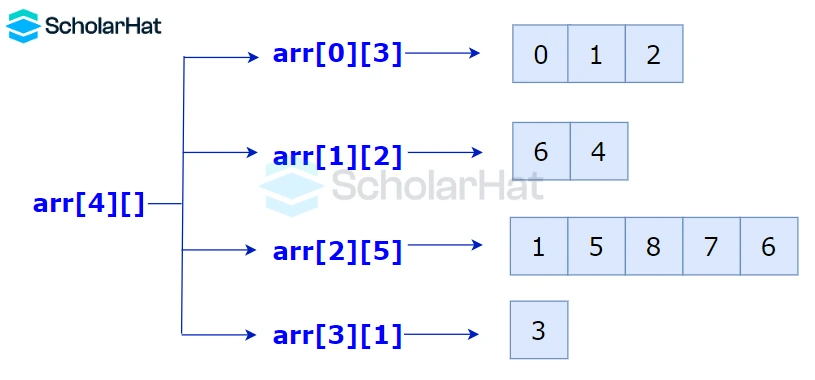
27. What is the difference between late binding and early binding in C#?
| Early Binding | Late Binding |
| Occurs at compile-time. | Occurs at runtime. |
| Type checking is done at compile-time. | Type checking is done at runtime. |
| Provides better performance as the method or property is resolved at compile-time. | Provides more flexibility but may lead to performance overhead due to runtime resolution. |
| Achieved using the "static" keyword in C#. | Achieved using reflection or dynamic keyword in C#. |
28. Can “this” be used within a static method in C#?
Yes, the "this" keyword can be used within a static method in C# to reference static members of the class. However, it cannot be used to refer to instance members because static methods are not associated with a specific instance of the class.
29. What are the different ways in which a method can be Overloaded in C#?
In C#, methods can be overloaded in several ways:
- Different Parameter Types: Methods can be overloaded by having different parameter types.
- Different Number of Parameters: Overloading can be done by varying the number of parameters in the method.
- Different Parameter Order: Methods can have the same parameter types but in a different order.
- Different Data Types: Overloading is possible by using different data types for parameters.
- Optional Parameters: Overloading can be achieved by using optional parameters in methods.
- Different Return Types: Overloading based on different return types is not allowed; it's not a valid way to differentiate methods.
These techniques enable developers to create methods with the same name but different behaviours based on input parameters.
30. What is an extension method in C#?
In C#, an extension method is a static method that allows developers to add new methods to existing types without modifying their source code. These methods are defined in static classes and can be called as if they were instance methods of the extended type, providing a way to extend the behaviour of classes without inheritance or modification of the original code.
Example
public static class StringExtensions
{
public static string CapitalizeFirstLetter(this string str)
{
if (string.IsNullOrEmpty(str))
return str;
return char.ToUpper(str[0]) + str.Substring(1);
}
}
Explanation
The given code in the C# Editor defines an extension method called CapitalizeFirstLetter for the string class, which capitalizes the first letter of a string. To use this extension method, you would call it on a string object.
Output
Hello world31. What is the difference between Dispose and Finalize in C#?
Dispose():
- Used for releasing unmanaged resources explicitly.
- Implemented through the IDisposable interface.
- Invoked by the developer to release resources when they are no longer needed.
- Provides a way to clean up resources before the object is garbage collected.
Finalize():
- Also known as a destructor in C#.
- Automatically called by the garbage collector to clean up unmanaged resources.
- No guarantee on when it will be executed.
- Generally used as a backup cleanup mechanism if Dispose() is not called explicitly.
32. What is IEnumerable<> in C#?
IEnumerable<> is an interface in C# that represents a collection of objects that can be enumerated (iterated) one at a time. It is defined in the System.Collections namespace. Implementing IEnumerable<> allows objects to be iterated using a foreach loop. It includes a single method, GetEnumerator(), which returns an IEnumerator<> interface for iterating through the collection.
33. What are the differences between IEnumerable and IQueryable?
IEnumerable and IQueryable are both interfaces in C# for querying collections of data, but they have key differences:
IEnumerable:
- Suitable for in-memory collections like lists and arrays.
- Executes queries locally in memory.
- Pulls all data into memory before filtering, sorting, or projecting.
- Limited support for deferred execution.
- Suitable for LINQ to Objects.
IQueryable:
- Designed for querying data stores like databases.
- Executes queries on the data source, minimizing data transfer.
- Supports deferred execution with expressions.
- Suitable for LINQ to Entities (Entity Framework) and other data access technologies.
34. What are the Arrays in C#?
In C#, an array is a collection of elements of the same data type, grouped together under a single name. Arrays allow you to store and manipulate multiple values of the same type. They are defined using square brackets and can store elements such as integers, strings, or custom objects. Array elements are accessed by their index, starting from 0.
In C#, there are mainly three types of arrays:
- Single-Dimensional Arrays: Contains elements in a single row.
- Multi-Dimensional Arrays: Contains elements in multiple rows and columns.
- Jagged Arrays: Array of arrays where each element can be an array, allowing different lengths for each row.


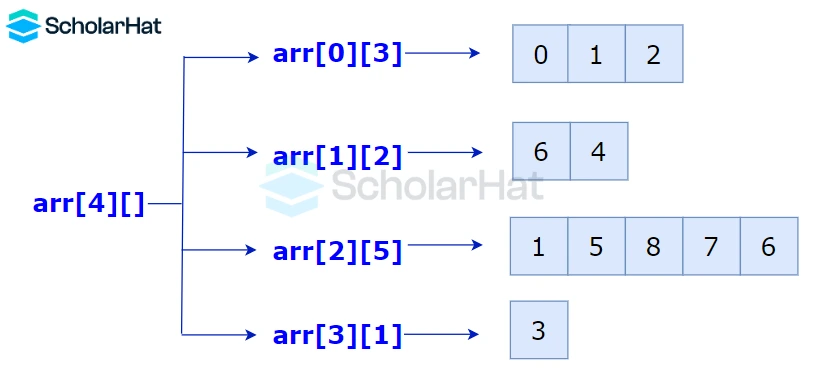
35. What is the Constructor Chaining in C#?
Constructor chaining in C# refers to the process of calling one constructor from another within the same class or in a derived class. It allows you to reuse code and initialize object properties in different ways. By using "this" keyword to invoke another constructor in the same class or "base" keyword to invoke a constructor in the base class, developers can streamline object creation and initialization.
C# Interview Questions and Answers for Experienced
36. What’s the difference between the Array.CopyTo() and Array.Clone()?
- Array.CopyTo(): Copies elements from one array to another array. The destination array must already exist and have compatible data types. You can specify the index from which to start copying in the destination array.
- Array.Clone(): Creates a shallow copy of the array. It creates a new array with the same length and data type as the original array. Changes to elements in the cloned array do not affect the original array, but if the elements are reference types, they still refer to the same objects as the original array.
In summary, CopyTo() copies elements to an existing array, allowing customization of the destination index, while Clone() creates a new array with the same elements and data types, providing a shallow copy of the original array.
37. What is Reflection in C#?
In C#, reflection is a mechanism that allows you to inspect and manipulate assemblies, modules, and types at runtime. It enables you to dynamically load assemblies, create instances of types, invoke methods, and access properties and fields, even if those types are not known at compile time. Reflection is commonly used for tasks like creating plugins, serialization, and dynamic code generation.
38. Can multiple catch blocks be executed in C#?
No, in C#, only one catch block is executed when an exception is thrown. The catch blocks are evaluated sequentially, and the first catch block that matches the type of the thrown exception will be executed. Once a matching catch block is found and executed, the control will not pass to any subsequent catch blocks in the same try-catch block structure.
39. What is Jagged Arrays in C#?
In C#, a jagged array is an array whose elements are arrays themselves. Unlike a multidimensional array, jagged arrays allow each row to have a different length. This flexibility is useful when dealing with data structures where the size of the elements varies, enabling efficient memory usage and manipulation of complex data sets in C# programs.
40. What are sealed classes in C#?
In C#, a sealed class is a class that cannot be inherited by other classes. It is marked with the "sealed" keyword to prevent further derivation. Sealed classes are typically used to restrict the inheritance hierarchy, ensuring that specific classes cannot be extended, providing better control over the code, and preventing unintended modifications or extensions.
Syntax
sealed class class_name
{
// data members
// methods
.
.
.
}41. What is the Constructor Chaining in C#?
Constructor chaining in C# allows a constructor to call another constructor within the same class. This enables reusability and reduces code duplication by allowing constructors to invoke other constructors in the same class using the "this" keyword. It simplifies object initialization by providing multiple ways to construct objects with different parameters, enhancing code flexibility and readability.
42. What is a multicasting delegate in C#?
In C#, a multicast delegate is a delegate that can hold and invoke multiple methods simultaneously. It can reference multiple methods, allowing them to be invoked sequentially when the delegate is called. This enables the invocation of multiple methods through a single delegate, simplifying event handling and callback scenarios in applications.
43. What are Generics in C#?
Generics in C# allow you to create classes, interfaces, methods, and delegates with a placeholder for the data type. This enables you to design flexible and reusable code by specifying the actual data type when the code is used, ensuring type safety and performance improvements. Generics enhance code readability and maintainability by writing algorithms and data structures that work with any data type.
44. Describe Accessibility Modifiers in C#?
Keywords called "access modifiers" specify how accessible a class, member, or datatype is inside a program. These are mostly used to prevent unauthorized programs or classes from manipulating data. The four main modifiers are:
- Public: Members are accessible from any code.
- Private: Members are accessible only within the same class.
- Protected: Members are accessible within the same class or its derived classes.
- Internal: Members are accessible within the same assembly (DLL).
45. What is a Virtual Method in C#?
In C#, a virtual method is a method declared in a base class with the virtual keyword, allowing derived classes to provide their implementation by overriding the method. This enables polymorphism, where the appropriate method of the derived class is called at runtime based on the actual type of the object, facilitating dynamic method binding and inheritance-based behavior customization.
46. What is Multithreading with .NET?
Multithreading in .NET allows programs to perform multiple tasks concurrently, enhancing performance and responsiveness. It enables the execution of multiple threads within a process, allowing applications to perform tasks simultaneously. .NET provides classes like System.Threading.Thread and ThreadPool to create and manage threads, facilitating efficient utilization of system resources and improved user experience in multithreaded applications.
47. What is a Hash table class in C#?
A hash table class in C# is a data structure that stores key-value pairs, providing fast retrieval of values based on their associated keys. It uses a hash function to map keys to indices in an internal array, allowing constant-time average complexity for basic operations like insertion, deletion, and lookup. The Hashtable class in C# is an implementation of a hash table, part of the System.Collections namespace, providing these functionalities.
48. What are namespaces in C#?
In C#, namespaces are used to organize and categorize code elements, such as classes, interfaces, and methods, into logical groups. They prevent naming conflicts by providing a way to uniquely identify types within an application. Namespaces improve code readability, maintainability, and reusability by creating a hierarchical organization of classes and other code elements, making it easier to manage large and complex projects.
49. What is LINQ in C#?
LINQ (Language Integrated Query) is a feature in C# that enables developers to query and manipulate different types of data, such as arrays, collections, databases, and XML, using a consistent and readable syntax. It allows developers to write SQL-like queries directly in C# code, providing powerful and efficient data querying capabilities. LINQ simplifies data manipulation and retrieval tasks, enhancing productivity and readability in C# programming.
50. What is File Handling in C#?
File handling in C# refers to the process of working with files, such as reading from or writing to them. C# provides various classes and methods in the System.IO namespace to perform file operations. Developers can create, delete, read, write, and manipulate files using these classes, enabling efficient management of data stored in files within C# applications.
Summary
In conclusion, mastering these top 50 C# interview questions and answers is essential for excelling in C# programming interviews. By understanding these concepts thoroughly, candidates can confidently navigate challenging interview scenarios, showcasing their skills and knowledge. You can also consider doing our C# tutorial from Scholar Hat by Dot Net Tricks to upskill your career. Practice, understanding, and confidence in these areas will undoubtedly pave the way to a successful C# programming career.
FAQs
Q1. How to prepare for C# coding interview?
- Object-Oriented Programming (OOP) Concepts. Question: How would you explain the concept of encapsulation in C#?
- Delegates and Events.
- Exception Handling.
- LINQ (Language Integrated Query)
Q2. What is class in C# interview questions?
Q3. What is the general knowledge of C#?
Take our free csharp skill challenge to evaluate your skill

In less than 5 minutes, with our skill challenge, you can identify your knowledge gaps and strengths in a given skill.





